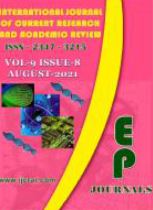Abstract Volume:9 Issue-8 Year-2021 Original Research Articles
 |
Online ISSN : 2347 - 3215 Issues : 12 per year Publisher : Excellent Publishers Email : editorijcret@gmail.com |
Electrical resistivity profiling and geochemical analyses of soil and groundwater were carried out around an closed battery factory in Ibadan, southwestern Nigeria with a view to delineating conductive zones possibly due to heavy metal contamination. The resistivity data were acquired along eight profiles using the dipole-dipole electrode array and interpreted using 2D inversion procedures. Groundwater and soil samples were collected respectively from hand-dug wells/boreholes and trial pits located near conductive zones observed on the inverted 2D resistivity sections. Geochemical analyses were conducted on the samples for Lead, Cadmium, Zinc and Copper using Atomic Absorption Spectrometry, to determine their concentrations. The study revealed heavy metal contamination in the vicinity of the abandoned battery factory. The concentrations of Zinc and Copper in the soil and groundwater are within WHO permissible limits. While the concentrations of Lead and Cadmium are above the WHO limits in the groundwater in some parts, they are exceedingly higher in soil for Lead in part, and Cadmium in all of the study area.
How to cite this article:
Akinlabi, Ismaila Abiodun. 2021. Geoelectrical and Geochemical Assessment of Soil and Groundwater Contamination Induced by Heavy Metals from A Closed Battery Factory in Ibadan, Southwestern Nigeria.Int.J.Curr.Res.Aca.Rev. 9(8): 7-15doi: https://doi.org/10.20546/ijcrar.2021.908.002



Quick Navigation
- Print Article
- Full Text PDF
- How to Cite this Article
- on Google
- on Google Scholor
- Citation Alert By Google Scholar
